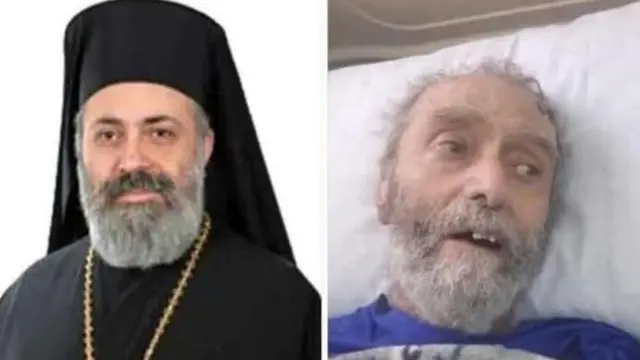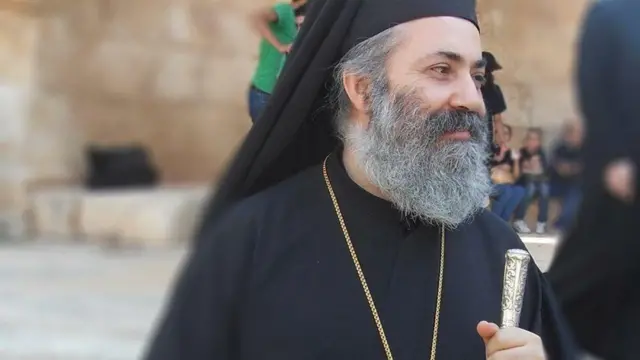
image source, Social Media
The Greek Orthodox Patriarchate of Antioch and All the East denied the circulating picture of a person who was said to have been released from a Syrian prison, and that it was of Bishop Boulos Yazigi, the Greek Orthodox Bishop of the Diocese of Aleppo, who has been missing for 11 years.
This came in response to the news that spread recently about the discovery of Bishop Yazigi in a Syrian prison following the fall of Bashar al-Assad’s regime, after years of mystery surrounding his fate. The Syriac Orthodox Bishop of Aleppo, John Ibrahim, was with him after they were kidnapped in 2013 while they were carrying out humanitarian missions in Syria.
The Patriarchate said in the statement: “What is being circulated is baseless and that the person referred to is not Bishop Boulos Yazigi.”
She added that the Patriarchate directly investigated the facts, identified the person concerned in the hospital, and examined him thoroughly medically and scientifically, and confirmed that “he is not the missing bishop.”
The Greek Orthodox Patriarchate of Antioch and All the East stressed that it places this issue “at the forefront of its concerns,” and called on its members to rely on “reliable sources” to avoid the spread of false news that may increase the suffering of Christian families.
Lebanese media reports stated that the person whose photo spread was not the missing bishop, but rather an elderly Lebanese man named “Muhammad Qabbani,” from Beirut, who was receiving treatment at Bisan Hospital in Homs, and was not detained in Adra prison in Syria.
Bishop Yazigi is an example of the ongoing tragedy in Syria throughout the years of civil war, which has led to thousands of missing persons who have not yet been found since the fall of Bashar al-Assad’s regime.

image source, SocialMedia
Who is Bishop Boulos Yazigi?
Bishop Boulos Yazigi enjoyed a prominent religious position in Syria and the Christian world, due to his great contributions to promoting interfaith dialogue and his service to youth and society. Since his election as Metropolitan of Aleppo, he has been calling for peaceful coexistence between different sects.
He was born in the city of Latakia on the Syrian coast to a religious Christian family, in 1959. He obtained a civil engineering degree from Tishreen University in Syria, before deciding to go to study religious and theological sciences at the University of Thessaloniki in Greece.
He obtained a master’s degree in theology in 1989, then a doctorate in 1992 with distinction, and began his church life by teaching theology courses at the University of Balamand in Lebanon, and reached the position of dean of the Faculty of Theology.
Yazigi was elected Archbishop of Aleppo in 2000, and became one of the influential figures in the Orthodox Church in Syria.
How did Bishop Yazigi disappear?
With the outbreak of the Syrian crisis, Bishop Yazigi decided to intensify humanitarian work and help those affected by the events.
On Monday, April 22, 2013, an unknown armed group intercepted Bishop Yazigi’s car, and Bishop John Ibrahim was with him, while they were carrying out a humanitarian mission in Aleppo Governorate in northern Syria, and they disappeared since that time.
The Syrian government announced at the time that an “armed terrorist group” had kidnapped Bishop John Ibrahim, head of the Syriac Orthodox community in Aleppo and its environs, and Bishop Boulos Yazigi, head of the Greek Orthodox community in Aleppo and its environs, while they were carrying out humanitarian operations in the village of Kafr Da’el in the Aleppo countryside.
The opposition Syrian National Alliance also confirmed at the time that the two bishops were kidnapped on the road leading to Aleppo, from the Bab al-Hawa crossing, which is controlled by the opposition and located on the border with Türkiye.
He added that they were on a humanitarian mission to rescue kidnapped Orthodox and Catholic priests, when an armed group in the town of Mansoura in the western countryside of Aleppo intercepted their car on the road leading to Antakya, which is under the control of gunmen from the Nour al-Din al-Zenki Brigade, killed the car driver, and took them to an unknown destination. At that time, the kidnapping group was Chechen.
This incident sparked great interest in religious and humanitarian circles around the world, and their disappearance turned into a symbol of the suffering of the Syrian people and the disappearance of thousands of them since the escalation of events.
Despite international and local attempts to search for them, nothing was known about their fate, raising concerns about the safety of clergy and religious minorities in conflict areas.
According to international reports, this incident led to an increase in Christian immigration from Syria, as many felt unsafe, and the United Nations called on the Syrian regime and armed groups to reveal the fate of the two kidnapped bishops, to no avail.

